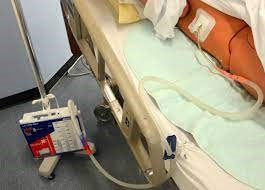A nurse is gathering data on a patient who has diarrhea.
Which of the following findings is a sign of hypokalemia?
Hypertension.
Cerebral edema.
Muscle weakness.
Hyperactive bowel sounds.
The Correct Answer is C
Choice A rationale:
Hypertension is not typically a sign of hypokalemia. Hypokalemia, or low potassium levels, can cause symptoms like fatigue, muscle weakness, digestive problems, and frequent urination. Hypertension, or high blood pressure, is not commonly associated with hypokalemia.
Choice B rationale:
Cerebral edema, or swelling in the brain, is not a common symptom of hypokalemia. Hypokalemia is more likely to cause symptoms related to muscle function and digestion, as potassium is an essential mineral that helps regulate muscle contractions, maintain healthy nerve function, and regulate fluid balance.
Choice C rationale:
Muscle weakness is a common symptom of hypokalemia. Potassium helps regulate muscle contractions. When blood potassium levels are low, your muscles produce weaker contractions. This can result in symptoms like muscle weakness and fatigue.
Choice D rationale:
Hyperactive bowel sounds are not typically associated with hypokalemia. Hypokalemia can cause digestive problems, but these are more likely to be issues like constipation rather than increased bowel sounds.
Nursing Test Bank
Naxlex Comprehensive Predictor Exams
Related Questions
Correct Answer is B
Explanation
Choice A rationale:
Tachycardia, or a rapid heart rate, is not typically an adverse effect of oxygen therapy. Oxygen therapy is often used to help people with conditions like COPD, COVID-19, emphysema, and sleep apnea get enough oxygen to function and stay well. While tachycardia can be a symptom of these conditions, it is not directly caused by the oxygen therapy itself.
Choice B rationale:
Cracks in the oral mucous membranes can indeed be an adverse effect of oxygen therapy. Oxygen therapy involves the delivery of highly concentrated oxygen, which can cause irritation and dryness in the airways, including the oral mucous membranes. This can lead to cracks and discomfort in the mouth. Therefore, it’s important for healthcare providers to monitor patients receiving oxygen therapy for signs of this adverse effect.
Excessive pulmonary secretions are not typically a direct adverse effect of oxygen therapy. While conditions that often require oxygen therapy, such as pneumonia and COPD, can lead to increased pulmonary secretions, these are symptoms of the underlying disease rather than the oxygen therapy itself.
Choice D rationale:
Poor skin turgor is not typically an adverse effect of oxygen therapy. Skin turgor refers to the elasticity of the skin, and poor skin turgor is often a sign of dehydration. While oxygen therapy can cause dryness of the mucous membranes, it does not typically affect the hydration status of the skin.
Correct Answer is D
Explanation
Choice A rationale:
Stripping the client’s chest tube every 2 hours is not recommended. Stripping can create high negative pressures in the tube that can cause damage to the lung tissue. It can also lead to increased pain for the patient and is generally not a standard practice in chest tube management.
Choice B rationale:
Looping the tubing of the chest tube on the client’s bed is not a recommended practice. The chest tube should be free of loops or kinks to allow for proper drainage of air and fluid from the pleural space. Any loops or kinks in the tube can lead to accumulation of fluid or air, which can cause complications such as tension pneumothorax.
The chest tube drainage system should not be placed above the level of the client’s heart. This can lead to the backflow of blood or fluid into the pleural space, which can cause complications such as hemothorax or pleural effusion. The drainage system should always be kept below the level of the client’s chest to allow for gravity-assisted drainage.
Choice D rationale:
Taping the connections on the client’s chest tube is a recommended practice. This is done to secure the connections and prevent accidental disconnection or dislodgement of the tube. An accidental disconnection or dislodgement can lead to complications such as pneumothorax or hemothorax. Therefore, all connections should be securely taped to prevent any accidental disconnections.

Whether you are a student looking to ace your exams or a practicing nurse seeking to enhance your expertise , our nursing education contents will empower you with the confidence and competence to make a difference in the lives of patients and become a respected leader in the healthcare field.
Visit Naxlex, invest in your future and unlock endless possibilities with our unparalleled nursing education contents today
Report Wrong Answer on the Current Question
Do you disagree with the answer? If yes, what is your expected answer? Explain.
Kindly be descriptive with the issue you are facing.
